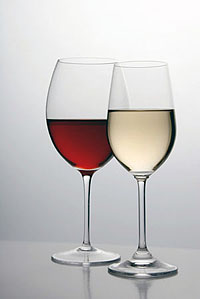Let’s change the subject a bit. Felix Salmon blogs about wine periodically and writes a wine column for Reuters, and one subject that pops up now and then is how blind tastings are affected by the price of a wine. Long story short, most of us suck at distinguishing cheap wines from expensive ones (I’m especially fond of the blind tastings where people can only barely tell  the difference between reds and whites), but we still prefer expensive wines anyway. Today, Felix links to a post from Jonah Lehrer explaining that this isn’t just pure snobbery. He describes an experiment showing that regardless of wine quality, a particular part of our brain lights up when we drink a wine we’re told is expensive:
the difference between reds and whites), but we still prefer expensive wines anyway. Today, Felix links to a post from Jonah Lehrer explaining that this isn’t just pure snobbery. He describes an experiment showing that regardless of wine quality, a particular part of our brain lights up when we drink a wine we’re told is expensive:
What’s causing this silly behavior? [Paul] Bloom argues that essentialism plays a big role. We automatically believe that more expensive wine has a tastier essence, and that belief alters our sensory expectations. Those expectations, in turn, alter our perceptual interpretations, so that what we experience conforms to what we expect to experience. The essence of the thing has thus been confirmed: more expensive wine tastes better, even if the expensive wine is really Gallo Hearty Burgundy. This helps explain why so many food advertisements focus on the “essence” of the product, whether it’s Coors being brewed from Rocky Mountain spring water, or Evian coming straight from the French Alps. The marketers know that the easiest way to increase our pleasure isn’t by telling us how pleasurable the product is: It’s by weaving an engaging story about essences.
OK, fine. But as a philistine non-wine drinker, here’s my question: If you happen to be among the enlightened few who know about this research and accept it as true, shouldn’t that affect how you react? It’s sort of like knowing that someone is giving you a placebo. It wouldn’t work if you knew it was a sugar pill, would it?
Or would it? In any case, here’s a budget tip for tough recessionary times: instead of buying expensive wines, train your brain to understand the effect of price on the wine-drinking experience. I know you can do it. And the rewards are great: a lifetime of wine enjoyment at fifteen bucks a bottle. That’s worth a few weeks of on-the-job training, isn’t it?

















